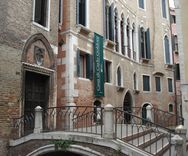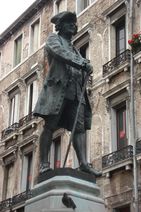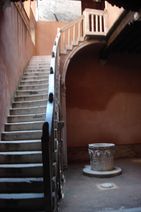
|

CARLO GOLDONI
Carlo Goldoni was born in Venice on 25th of February 1707 at the
Gothic palace called Ca' Centanni (which now houses the museum
dedicated to him). He was the son of Giulio, a paramedic, and
Margherita Salvioni. The young Carlo had a strong propensity for art,
he wrote his first theatrical essay in 1716, when he was only 9
years. In 1719 followed his father in Perugia where he attended
courses in grammar and rhetoric at the Jesuit college. Carlo
Goldoni moved to study to Rimini (1720), a year later went to
Chioggia and then began an apprenticeship in a law firm in Venice.
Between 1723 and 1725 he attended courses at the College
Ghislieri of Pavia from which he was expelled for writing "The
Colossus", an outrageous satire on some girls of that city. Between
1725 and 1730 he stayed with his father in Udine, then Modena, in
Chioggia and Feltre. In this period he composed and
published his first sonnets. Finally graduating
in Padua in Law (1731), the year after he composed "The Venetian
Gondolier". The year 1732 saw Carlo Goldoni wander for northern Italy.
He composed "Amalasunta", a lyric tragedy that was a great failure at
theater. Carlo Goldoni in 1736 went to Genoa where he met and married
Nicoletta Conio, daughter of a notary.

Carlo Goldoni became director of the St. John Chrysostom Theatre,
actually Teatro Malibran, (1737). He was subsequently appointed Consul of
the Republic of Genoa in Venice (1739). In 1741 he wrote "The Failed
Merchant". Carlo Goldoni between 1743 and 1744 stayed in Bologna and
then moved to Rimini, then went to Pisa where worked for three years as
a lawyer. In this period was the first real success of Carlo Goldoni,
"Harlequin Servant of Two Masters". Back in his hometown where composed
"The Merry Widow" (1748), represented for the first time at the
Sant'Angelo Theatre. In the 1749 he composed "La Putta Onorata", while a
year later it was the turn of a masterpiece by Carlo Goldoni: "The
Family of the Antique". Then he composed the "The Lucky Heir" that will be a
real failure. Carlo Goldoni promised to his admirers that for the
1751 he will compose 16 comedies. Among these are the most
celebrated: "La Bottega del Caffè" and "La Finta Ammalata".
Following the intense work of composition, Carlo Goldoni falls into a state of depression.
Decides to follow his own theatre company to Turin. Then he went
to Sant'Angelo Theatre where was played the masterpiece La Locandiera
(which will be played much later by actress Eleonora Duse),
from now onwards as a result of disagreements he will work for the
San Luca Theatre. In 1760 was written the comedy "I Rusteghi". The 1762
saw the creation of many of the most famous comedies by Carlo Goldoni:
"Sior Todero Brontolon", masterfully interpreted in the twentieth century
by the actor Cesco Baseggio, "Le Baruffe Chiozzotte",
and "One of the Last Evenings of Carnival", which was the last comedy
represented in Venice by Carlo Goldoni, who finally dismisses his audience on the
evening of the 16th February 1762.

Carlo Goldoni, finally bored of continue criticisms and controversies
with the playwright Carlo Gozzi, (his great rival who represented
comedies of fantasy unlike its inspired by real life), decided to
leave his city to go to Paris. Probably in the beginning Goldoni
thought to move only for a few months but ended up remaining there
the rest of his life (his self-exile lasted about 30 years). The big
opportunity came with the appeal of the Comédie Italienne, an Italian
theater company stated in Paris. It required that Carlo Goldoni would join
them in the hope of obtaining even the magnificence of the Commedia
dell'Arte, which now languish there. Then he arrived in
Paris on the 26th of August 1762 and in the following months he will be invited
to stay at the Palace of Versailles during the reign of Louis XV. He
was assigned the task of Master of Languages (Italian teacher) for the
Delfine court, while he still worked, without enthusiasm, with the Comédie
Italienne. Meanwhile at the S. Luca Theatre was played a famous
comedy of Goldoni, "Il Ventaglio" (1765). He wrote some comedies in French but
without success. He let the court of Versailles to settle permanently
in Paris (1780), still receiving a pension.
He wrote between 1784 and 1787 "Mémoires", which recounts his life
and his works. During 1789 it unleashed the French Revolution,
and Carlo Goldoni lost his pension. The last years of his
life he was sick and poor, assisted only by his wife Nicoletta and
nephew Antonio. Carlo Goldoni died in Paris on the 6th of February 1793.
The city wanted to dedicate a statue to Carlo Goldoni (see photo),
the playwright that most interpreted the spirit of its eighteenth
century. This statue is located in S. Bartolomeo Square, a stone's
throw from the Rialto Bridge, and was built in 1883 by sculptor A.
Dal Zotto.
Carlo Goldoni has composed during his long life more than 200 works,
among which, in addition to the famous comedies, some compositions and
poetic dramas, musics and dramas for playful melodramas, and some tragicomedies.
As he has been able to create for the theatre, Carlo Goldoni can be approached
in importance to Shakespeare and Molière, without losing in comparison.
Cheap hotel in Venice
|